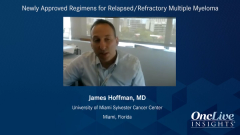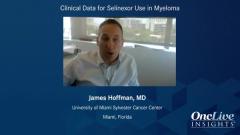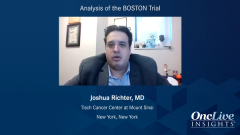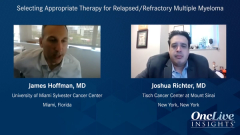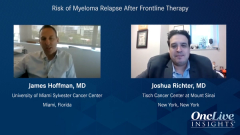
Selecting Appropriate Therapy for Patients With Relapsed/Refractory Multiple Myeloma
James Hoffman, MD, and Joshua Richter, MD, discuss the IKEMA study, the appropriate selection of therapy, and the differences between various options.
Episodes in this series

Joshua Richter, MD: We did touch a little earlier on the IKEMA study: isatuximab, Kyprolis [carfilzomib], dexamethasone. I don’t know if you have any thoughts about daratumumab vs isatuximab. Are they interchangeable? Are there patients you would give DKD [daratumumab, carfilzomib, dexamethasone] or isatuximab–KD [carfilzomib, dexamethasone]? Just general top-line thoughts.
James Hoffman, MD: As we referenced earlier, it’s a little tricky when we don’t have data on 1 and then the other. We don’t know if either can be a backup plan for the other. Some of the things I factor in—certainly these patients get daratumumab first in my practice because daratumumab has been around longer. I wouldn’t bypass daratumumab. The question becomes where do you put isatuximab? The way I’ve done it, to this point in my practice, is that as a general rule I’ll use daratumumab re-treatment. If somebody has failed daratumumab and lenalidomide and they’re going on some other treatment and it’s months later, I have no qualms going to daratumumab and carfilzomib. The patients who I think of as isatuximab first as opposed to daratumumab re-treatment are ones whom the IV [intravenous] treatment doesn’t bother. Meaning they have access already, or it’s not an issue for them to sit in the treatment room. Or they’re getting carfilzomib, so they have IV access already. That’s been a plus for patients. I’m going to use carfilzomib, and I want to use a CD-38 and they’ve already been treated with daratumumab. I get the advantage of a slightly different mechanism, a slightly different epitope, and that’s been the cluster of patients for whom I’ve focused on isatuximab. It’s reasonable to use it in all re-treatments after a washout. But the ones with carfilzomib are who I’ve looked at. One final point is that some people try to make these cross-comparisons among these studies, and we both know that can be very perilous. You see control groups doing very differently across these studies so I try not to do that in terms of my decision-making. How about you?
Joshua Richter, MD: I struggle at figuring out where it fits in. I did start a patient on the isatuximab–KD [carfilzomib, dexamethasone] regimen within the last week. She is a little older. She got daratumumab -Revlimid [lenalidomide] as up-front therapy and was on a low dose of Revlimid [lenalidomide]. When COVID-19 hit, she didn’t want to be on a parenteral therapy. I put her on IRD [ixazomib, lenalidomide, dexamethasone]. She was on IRD [ixazomib, lenalidomide, dexamethasone] during COVID. She relapsed. She went on elotuzumab-pomalidomide for a while and then relapsed, and I wanted to give her a Kyprolis [carfilzomib]-based regimen. It had been more than 6 months, so I put her on isatuximab–KD [carfilzomib, dexamethasone] this week. Apart from her, it’s an ongoing struggle. You bring up 1 of the most important points is: You can’t compare trial to trial. It’s hard to say this 1 works better or this is a different AE [adverse event] profile. They’re a different group of patients. As both drugs spend more time in the clinic together, we’ll work our way through this as a community.
Transcript Edited for Clarity


